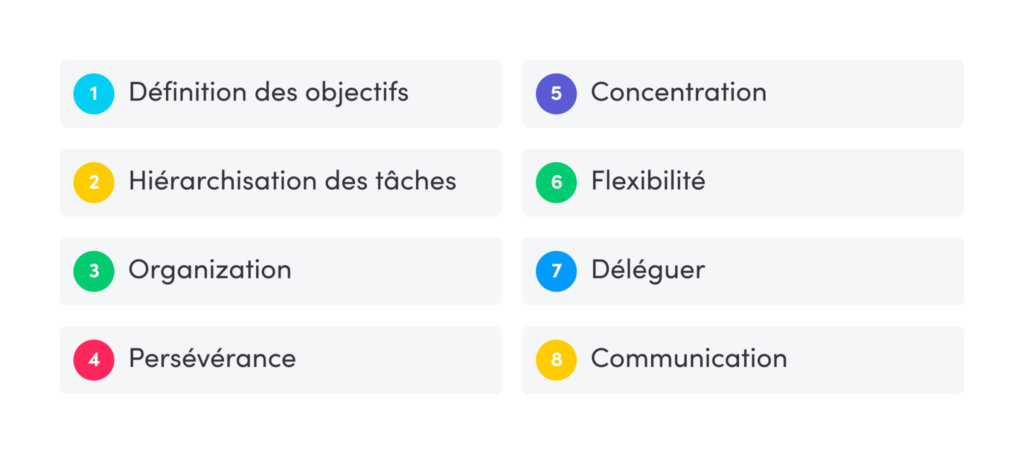Your day begins with an avalanche of emails and messages on Slack. Before you can process them all, it's meeting time. The coffee you've been waiting for isn't enough to make up for the time.
More meetings, emails and worries to deal with. And of course, work to finish on time.
At 5pm, despite the hustle and bustle, the to-do list is still full. Sound familiar?
Many employees and managers experience this mad rush. Overwhelmed, they are less productive. Poor time management is to blame. But there is a solution.
Time management: a challenge for employees and managers alike
The Harvard Business Review refers to this phenomenon of unproductive activity caused by poor time management as "active inaction".
Active inaction is when you think you're dealing with urgent, important matters, but you're just pedaling along. It's very common in the modern working world.
Here are a few factors that contribute to active inaction:
- The pressure of fast work
- The pace of business is accelerating, putting pressure on employees. Workloads are increasing, creating stress and exhaustion.
- Showing commitment
- Many believe that the busiest people are the most involved. Employees do too much to prove their worth, even if it's unmanageable.
- A toxic culture
- If your company rewards bad habits and prioritizes the appearance of activity over productivity, it encourages active inaction.
- Unsuitable digital tools
- Work and time management must be based on integrated, automated digital solutions to free up time and reduce stress.
Back to basics: what is time management and why is it important?
Time management is the ability to plan and control how you spend your days in order to achieve your goals. Effective time management involves setting clear goals and priorities, which help you identify essential and non-essential tasks. Time management affects our work, our home, our social life, our side projects and our leisure time.
In our hectic, digital, professional lives, time management allows us to control each day and make the most of every hour. It allows us to be more productive and efficient without spending hours working late into the night.
How does time management affect your life?
Time management has an impact on:
- What we want to do versus what we actually do
- How to prioritize what's really important
- How we plan
- The efficiency with which we progress towards long-term objectives
- How we integrate breaks and free time into our day
- Our stress levels (and therefore our general well-being)
Our guiding principle for time management: focus on the what, not the how
Don't plan how you're going to spend your time. Instead, figure out what you want to accomplish and when. This will help you shift your focus from time spent (which often leads to that feeling of stress and superficiality) to progress and execution. Adopting this approach requires a change of mindset, but once you start using this principle, you're well on the way to regaining control of your day and increasing your productivity.
3 characteristics of effective time management
There are three main characteristics of effective time management:
- Accountability - Do you take responsibility?
- Motivation - Are you proactive and determined to use your time wisely?
- Realism - Are your goals and deadlines realistic?
Employees and managers who fall victim to active inaction are often highly motivated and assume their responsibilities, but they lack the third crucial characteristic: they are not realistic. It's not realistic to try to get everything done in record time and to the highest possible quality.
That's why we need to slow down, set targets and establish priorities.
8 key skills for managing your time like a pro
We all know that to manage time well, you need to be responsible, motivated and realistic. But what skills do you need to develop to really master time management? Here are 8 essential skills:

1. Setting goals
This is the first step: clearly defining what you want to achieve, whether alone or as part of a team.
2. Rank tasks by importance
It's essential to know which tasks have priority and which can wait or be delegated. It helps you move forward.
3. Getting organized
Being organized means keeping control and not forgetting anything. It means managing resources and information, tracking progress and communicating with others.
4. Persevere
Don't give up, especially on long-term projects. Perseverance helps to complete tasks on time.
5. Stay focused
Distractions waste a lot of time. You have to stay focused on your objectives to avoid getting distracted.
6. Be flexible
It's important to be adaptable. The unexpected can force us to change our plans, so don't stress, just adjust!
7. Delegate
We're not superheroes, but we have to know how to share our work with others. It makes things move forward and it's a relief.
8. Communicate
It's essential, especially in a team. Good communication helps us stay on the same wavelength and move forward together.
What is a SMART objective?
We've seen that setting goals is crucial to managing your time. The pros of time management and organization have developed a brilliant method for doing just that.
The SMART method helps to define clear, achievable objectives. It was developed by the great names in management, Peter Drucker and Robert S. Rubin. A SMART objective has these characteristics:
- Specific - Is the objective clear and important?
- Measurable - How do you measure success?
- Achievable - Is it realistic and feasible?
- Realistic - Does it serve any important purpose?
- Time - Can we plan the stages?
The SMART list is a great tool for making the most of your time, resources and energy, and getting the best results.
6 tips for better time management
Here are six tips to improve your time management and avoid active inaction.

- Set goals (using the SMART method) and prioritize your tasks.
Be clear about your objectives and deadlines for success.
- Focus on your goals rather than the time spent on each task.
Decide what you want to achieve at the end of each work session, so that you can move forward more quickly. - Plan your work by thinking about the resources and time required.
A good timetable with milestones and deadlines will help you get ready. - Valorize responsibility and progress rather than false activities.
Change the culture to eliminate active inaction and focus on quality and progress. - Use a time management template to create a standardized basis.
A reproducible template for each project facilitates the best use of time. - Adopt a time management system to simplify monitoring and communication.
Tools as a Work OS automate repetitive work and simplify organization to save time.
Work OS: the ultimate time management tool
In the digital age, it's crucial to have time management adapted to our digital ecosystem. Work OS is the ideal tool for this.
Work OS centralizes everything for teams. It integrates with existing applications and systems, providing a clear platform for managing work. You can list tasks, add comments, tag colleagues, update status and track performance.
Platforms like monday.com make it easier to set objectives, delegate, meet deadlines and communicate.
At Zippo, monday.com has simplified project management and accelerated cycles. Since adopting monday.com, Zippo has increased its project volume by 87 % and saved the equivalent of 36 working weeks.
Manage your time better for success
Time management is essential to the success of any job. Without the right structure, bad habits set in, such as active inaction, and important projects are delayed.
By following these tips, you can improve the quality and speed of your work.
Want to be more productive? Try this team task management model.
Source: monday.com



